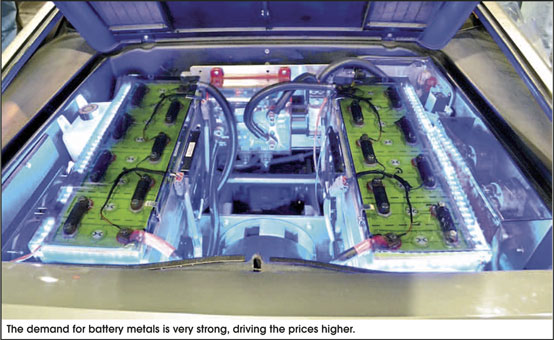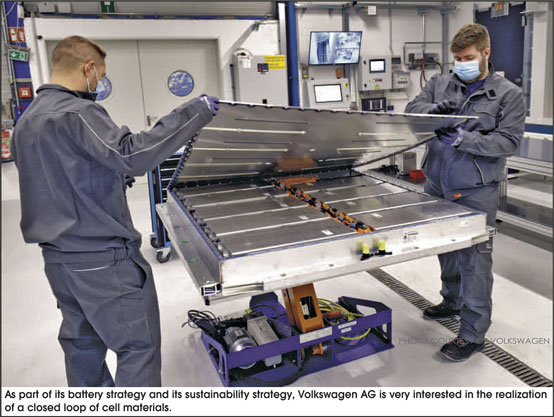by MAURA KELLER
The demand for lithium and other metals within EV batteries is set to grow exponentially in the coming years. While mining will continue to play a significant role in meeting the need for these battery materials, EV battery recycling is expected to help supplement mining and bridge the gap between supply and demand.

“Beyond the clear need to meet demand, battery recycling promotes sustainability, can be done domestically, and avoids some of the ecological and labor challenges associated with mining,” said Eric Frederickson, managing director of operations and compliance at Call2Recycle.
According to Fredrickson, EV battery chemistries depend on five minerals whose domestic supply is potentially at risk for disruption: lithium, cobalt, manganese, nickel and graphite, according to a Congressional Research Service report from early 2022.
“The U.S. Geological Survey designated these and other minerals as ‘critical,’ according to the methodology codified in the Energy Act of 2020,” Frederickson said. “To avoid supply chain issues, automakers are beginning to turn to battery recycling as a way to meet demand for key metals in batteries. Battery recyclers are also evaluating and investing in new technologies that will make recycling more efficient and maximize the quantity of metals extracted from EV batteries.”
Opportunities Abound
Industry experts agree that there is evident need for recycling of EV batteries and the materials they contain. Automakers and other industry players are preparing for the EV batteries that will reach their end-of-life in the years ahead. The federal government is increasingly supporting efforts to strengthen EV battery recycling too, which is part of a growing awareness of the need to secure a domestic supply of strategic minerals.
Frederickson pointed to the Bipartisan Infrastructure Law, which has earmarked funding for EV battery recycling, and part of $3 billion invested into the battery supply chain. The Inflation Reduction Act has also provided incentives for automakers to use recycled materials in their batteries, and EV manufacturers are already turning to battery recycling to help make their supply chains more sustainable.
“Altogether, the significant growth in EV battery recycling investment we’ve witnessed in recent years has been driven by a rapid increase in EV sales, strong demand for battery materials to power the transition to clean energy, growing awareness of the harms of improper recycling for large format batteries, and legislative efforts to create a domestic battery supply chain,” Frederickson said. “This convergence of factors offers a tremendous opportunity for the industry to scale up its capacity in coming years, but it also speaks to the volume of challenges facing the industry during its transition from a collection of startups to an established sector.”
Steve Christensen, executive director of the Responsible Battery Coalition (RBC), said that at the RBC, their OEM members are already looking to recycled metals from all viable form-factor batteries as sources of materials.

“Price and availability continue to be concerns. The demand for battery metals is very strong, driving the prices higher,” Christensen said. “The technology exists to refine spent battery components to be used in any form. However, the refining process to achieve that level increases the cost of these materials making them less desirable than newly sourced materials. Incentives for the use of recycled materials in batteries could change this.”
David Regan, vice president of commercial at Aqua Metals, said that cobalt, nickel and lithium are all critical metals, and are all expected to fall short of supply chain needs. According to Benchmark Metals, the year-over-year price increase of lithium is 182.6 percent and the International Energy Agency (IEA) says the world could face lithium shortages by 2025.
“The other critical metals are rapidly increasing in demand and in value and we could see shortfalls across the board if recycling does not ramp up to fill the supply gap. 2023 is a big year for recycling technologies to start delivering product to battery manufacturers both sustainably and economically,” Regan said.
Regan further pointed out that the global lithium-ion battery recycling market is projected to increase from $41B in 2021 to $116.6B by 2030, partly driven by the increased demand for EV batteries, fueled in turn by strict requirements and incentives, such as those for increased North American mining and battery production in the Inflation Reduction Act (IRA). Meeting those domestic requirements via mining is both time consuming and polluting.
“We do expect EV and lithium-ion battery manufacturers will have to incorporate recycled metals to meet demand in the near term. In fact, battery manufacturers and OEMs are already partnering and investing in recycling, knowing their mined raw material supply is likely to fall short within the coming decade,” Regan said.
New Challenges
As the EV market is a relatively new one, the challenges arising as it relates to recycling the metals within EV batteries are plentiful.
For one, Frederickson explained that the timeframe between when lithium-ion batteries enter the market and when they reach end of life, is estimated at 10 to 13 years, which adds a layer of complexity to scaling the industry.
“In the last few years, we’ve seen a significant number of new players enter the industry, so overall capacity to recycle batteries has gone up. But since many EV batteries won’t come off the market for years, there’s significant uncertainty about when these batteries will actually make their way to recycling plants,” Frederickson said. “Right now, many new processors are primarily recycling production scrap. Given the growth in domestic battery manufacturing, this will help get the industry up and running. Scaling the industry appropriately for end-of-life EV batteries will take careful planning, investment, and coordination, with readjustments at each step of the way as new data comes in and technology evolves.”
The industry will also need to figure out how to deal with other uncertainty, including whether demand for different battery materials will shift, how future legislation will affect battery sourcing and recycling, and if advanced battery compositions will alter the financial incentives of battery recycling.
Safety also needs to remain a priority throughout the recycling process. Proper handling, procedures and training are crucial to protect the physical safety of people and organizations trying to transport and recycle EV batteries, not to mention the environmental harms brought on by improper disposal.
“Given their size and weight, it’s not as simple as just removing these batteries, putting them in a box, and shipping them. There are a myriad of logistics, challenges and regulatory intricacies in safely and compliantly handling, storing, shipping and recycling EV batteries,” Frederickson said.
Call2Recycle is working to solve these challenges by sharing its vast regulatory and logistics expertise to address the unique challenges of EV batteries. Recently, Call2Recycle collaborated with the Suppliers Partnership for the Environment (SP) to publish a guidance document “Regulations Governing Shipment of Electric Vehicle (EV) Batteries in the U.S.”
“The guide was intended to help unravel those complexities by highlighting the noteworthy regulations and current requirements that stakeholders will need to understand and comply with when managing an EV battery at the end of its useful life,” Frederickson said.
Finally, Frederickson pointed to the lack of established pathways between EV owners and battery processors. That’s one of the areas that Call2Recycle is focused on: How can they facilitate and refine the EV battery’s journey from consumer to processor?
Craig Bouchard is the founder of Real Alloy and investor in Ecolution, which recycles, stores and distributes electricity consumed by moving vehicles. Ecolution and its partners/customers will become large buyers of first-life and second-life lithium-ion batteries.
According to Bouchard, manufacturers like Tesla, GM, Ford, BMW, Daimler, Volvo, Toyota, Nissan and others are trying as hard as they can to learn how to recycle to improve their costs and supply chain issues.
“But these large companies are not finding answers that move the needle. Not even Tesla, Bouchard said. “Lithium batteries need to follow the path of lead batteries, which are easily recyclable and have an industry with distribution that readily accepts and recycles lead batteries. But lithium batteries contain much more energy in small packages, which make them desirable for electronics and e-vehicles. My guess is that the global EV demand explosion will lead to new battery technologies, probably solid state in nature, eventually making lithium-ion yesterday’s news.”
Future Outlook
The recycling industry has always known that battery recycling is an important mechanism to prevent the environmental harms of batteries ending up in landfills, but we’re also starting to see broader recognition that battery recycling, especially for EVs, is a matter of fighting climate change and ensuring national security through critical minerals.
“Recycled metals are essential to a future circular economy for EV batteries. Research conducted by the University of Michigan in partnership with RBC member, Ford Motor Company, concluded that there would be sufficient resources for the next 100 years to support the growth in lithium demand from vehicle electrification with the condition that lithium from end-of-life vehicles is recycled,” Christensen said. “The research analyzed scenarios with recycling participation at 90 percent, 96 percent, and 100 percent and with a 90 percent lithium recovery efficiency.”
“It’s interesting to consider what the future will look like if and when EVs reach full market saturation. Once this happens, most of the metal used to make new EV batteries will come from recycled batteries,” Frederickson said. “On average, 80 percent of the lead used in U.S. manufacturing of new lead batteries comes from recycled lead batteries. While the economics of lead acid battery collection and recycling are different from EV battery recycling, it does provide a glimpse into a future where the main source of battery material comes from recycled batteries.”
As more and more EVs hit the road, Frederickson said there are plenty of reasons to be confident in the role metal recycling from EV batteries will play in the years ahead. The trick will be navigating future uncertainty and making sure that we don’t have too little or too much capacity to handle the EV batteries that reach their end-of-life.
“If we get it right, battery recycling will play an integral role in meeting the demand for the battery materials that will power an electrified economy,” Frederickson said.
Regan thinks high-purity recycled metals also will be a crucial component of the global effort to increase use of EVs and mitigate the devastating effects of climate change.
“The recycling industry is in its infancy, and will need to deliver on a sustainable, cost-effective supply chain for battery manufacturing,” Regan said. “Lithium-ion battery waste produced by EVs is currently expected to rise to 11M metric tons by 2030, so recycling is also a necessary endeavor to curb additional waste stream pollution. There is great opportunity here for the recycled metals industry and now is the time to start delivering.”
Published in the February 2023 Edition of American Recycler News







